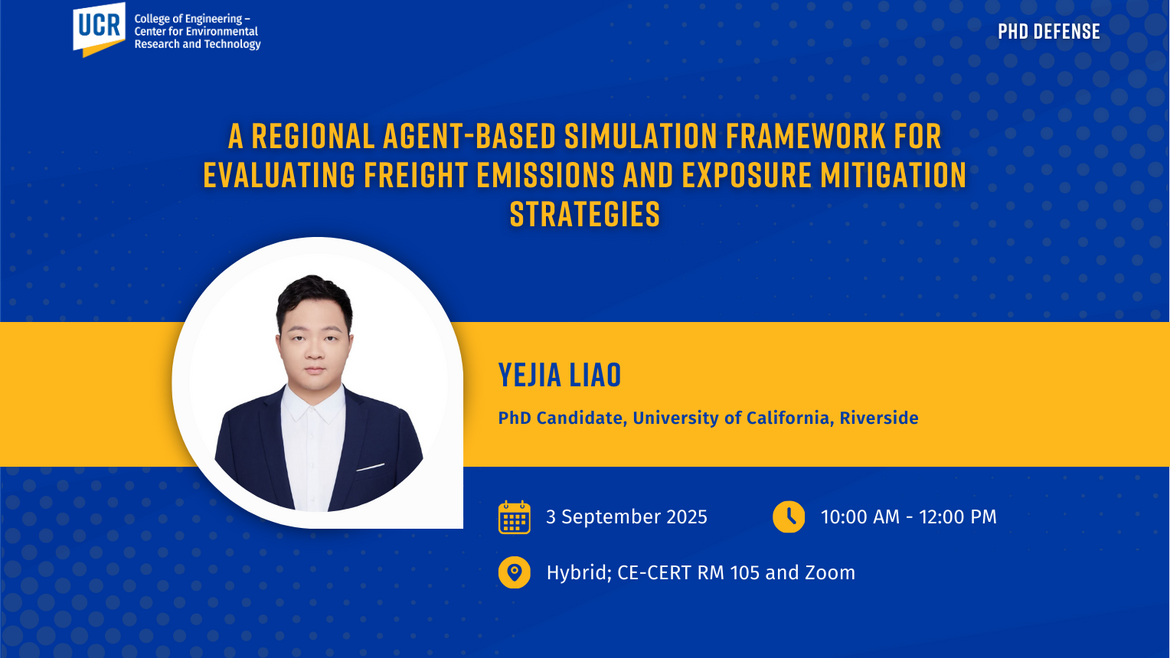
Yejia Liao | PhD Candidate, University of California, Riverside
Time: 10 AM - 12 PM
Location: Hybrid; CE-CERT RM 105 and Zoom (Join Zoom Meeting; Meeting ID: 930 0843 6448, Passcode: 112660)
Title: A Regional Agent-based Simulation Framework for Evaluating Freight Emissions and Exposure Mitigation Strategies
Abstract:
In recent decades, rapid economic expansion and the growth of logistics networks have not only fueled trade and job creation but also opened new prospects for regional development. The logistics industry growth escalates the demand for freight transportation. Freight transportation, particularly heavy-duty diesel trucks (HDDTs), plays a critical role in regional economic growth but contributes significantly to air pollution and public health risks, which has raised significant concerns among communities, policymakers, and researchers. This dissertation develops an integrated modeling framework that couples regional agent-based traffic simulation with air quality and exposure assessment to evaluate the environmental impacts of freight transportation and the potential benefits of various sustainable mitigation strategies.
The core of this research involves building a comprehensive, high-resolution simulation pipeline, beginning with the generation of integrated freight-passenger traffic demand and followed by activity-based traffic simulation. Emissions from simulated trips are then processed through two complementary air quality models to quantify the directly freight-related emissions’ impact on local communities and human exposure. To enhance the realism of traffic patterns and air quality models, real-world traffic data is employed through multiple sources and actual observational air quality data are collected to build the integrated air quality model. The simulation outputs demonstrate clear spatial and temporal patterns of pollutant dispersion, revealing that NOx and PM2.5 concentrations are heavily influenced by population proximity to major freight corridors and facilities.
Building upon this simulation foundation, the dissertation proposes and evaluates three sustainable mitigation strategies: low-exposure truck routing (LER), alternative truck routes, and truck electrification. Agent-based simulations show that with 100% LER penetration, exposure can be reduced by up to 30% with minimal increases in travel time. Alternative routing strategies demonstrate the effectiveness of diverting freight traffic away from sensitive areas. Truck electrification scenarios with varying market penetration rates (MPRs) show that converting 30% of HDDTs to electric trucks can reduce NOx concentrations by an average of 10%, with more pronounced benefits in residential zones compared to highways due to reductions in both running and idling emissions.
Overall, this research presents a novel and scalable framework to quantify the environmental and health benefits of emerging freight technologies and policies. It provides critical insights for urban planners, transportation agencies, and policymakers working toward a more sustainable and equitable transportation future in freight-intensive regions such as California’s Inland Empire.
Bio: Yejia Liao, Ph.D. candidate at the Center for EnvironmentalResearch and Technology at the University of California, Riverside. He receivedhis B.S. degree in Mathematics from Nankai University in 2018, and M.S. degreein Statistics from University of Wisconsin, Madison. The research interests includeintelligent transportation systems, traffic emissions modeling, and truck routingstrategies. Current research focuses on developing novel routing strategies, prioritizingpublic health, and evaluating sustainable transportation technologies usingagent-based simulation at transportation system levels.